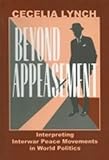Beyond Appeasement : Interpreting Interwar Peace Movements in World Politics / Cecelia M. Lynch.
Material type: TextPublisher: Ithaca, NY : Cornell University Press, [2018]Copyright date: ©2007Description: 1 online resource (256 p.)Content type:
TextPublisher: Ithaca, NY : Cornell University Press, [2018]Copyright date: ©2007Description: 1 online resource (256 p.)Content type: - 9781501728310
- 327.1/72/0973 23
- JZ5584.U6 L96 1999eb
- online - DeGruyter
| Item type | Current library | Call number | URL | Status | Notes | Barcode | |
|---|---|---|---|---|---|---|---|
 eBook
eBook
|
Biblioteca "Angelicum" Pont. Univ. S.Tommaso d'Aquino Nuvola online | online - DeGruyter (Browse shelf(Opens below)) | Online access | Not for loan (Accesso limitato) | Accesso per gli utenti autorizzati / Access for authorized users | (dgr)9781501728310 |
Frontmatter -- Contents -- Acknowledgments -- Introduction: Mythological Narratives and Critical Interpretation -- 1. An Interpretivist Approach to Social Movements and the Interwar Peace Movements -- 2. The Evolution of U.S. and British Peace Movements since 1815 -- 3. Reinterpreting the British Peace Movement in the 1920s -- 4. Normative Struggle and the British Peace Movement in the 1930s -- 5. Reinterpreting the U.S. Peace Movement in the 1920s -- 6. The U.S. Peace Movement and Internationalism in the 1930s -- 7. Peace Movements and the Construction of the United Nations -- Conclusion: Social Movements, Narratives, and Critical Analysis -- Archives and Private Papers -- Index
restricted access online access with authorization star
http://purl.org/coar/access_right/c_16ec
The interwar peace movements were, according to conventional interpretations, naive and ineffective. More seriously, the standard histories have also held that they severely weakened national efforts to resist Nazi Germany and Stalinist Russia. Cecelia Lynch provides a long-overdue reevaluation of these movements. Throughout the work she challenges these interpretations, particularly regarding the postwar understanding of Realism, which forms the basis of core assumptions in international relations theory.The Realist account labels support for interwar peace movements as idealist. It holds that this support—largely pacifist in Britain, largely isolationist in the United States—led to overreliance on the League of Nations, appeasement, and eventually the onset of global war. Through a careful examination of both the social history of the peace movements and the diplomatic history of the interwar era, Lynch uncovers the serious contradictions as well as the systematic limitations of Realist understanding and outlines the making of the structure of the world community that would emerge from the war.Lynch focuses on the construction of the United Nations as evidence that the conventional history is incomplete as well as misleading. She brings to light the role of social movements in the formation of the normative underpinnings of the U.N., thus requiring scholars to rethink their understanding of the repercussions of the interwar experience as well as the significance of social movements for international life.
Mode of access: Internet via World Wide Web.
In English.
Description based on online resource; title from PDF title page (publisher's Web site, viewed 26. Apr 2024)


